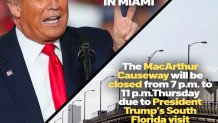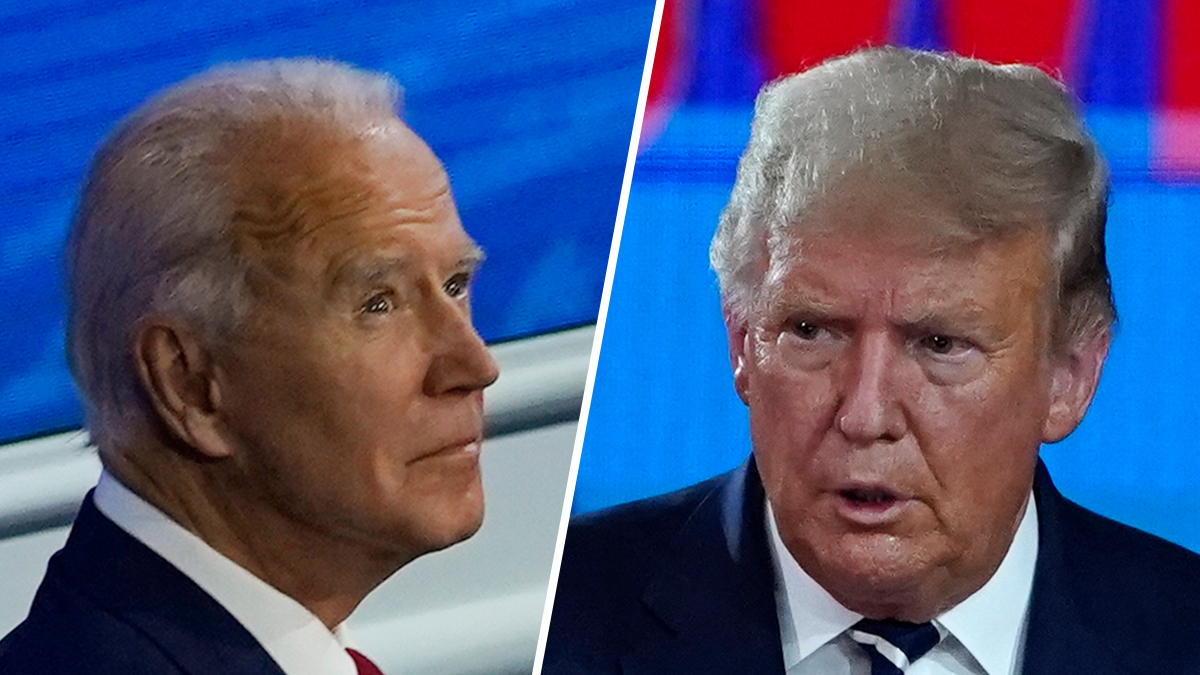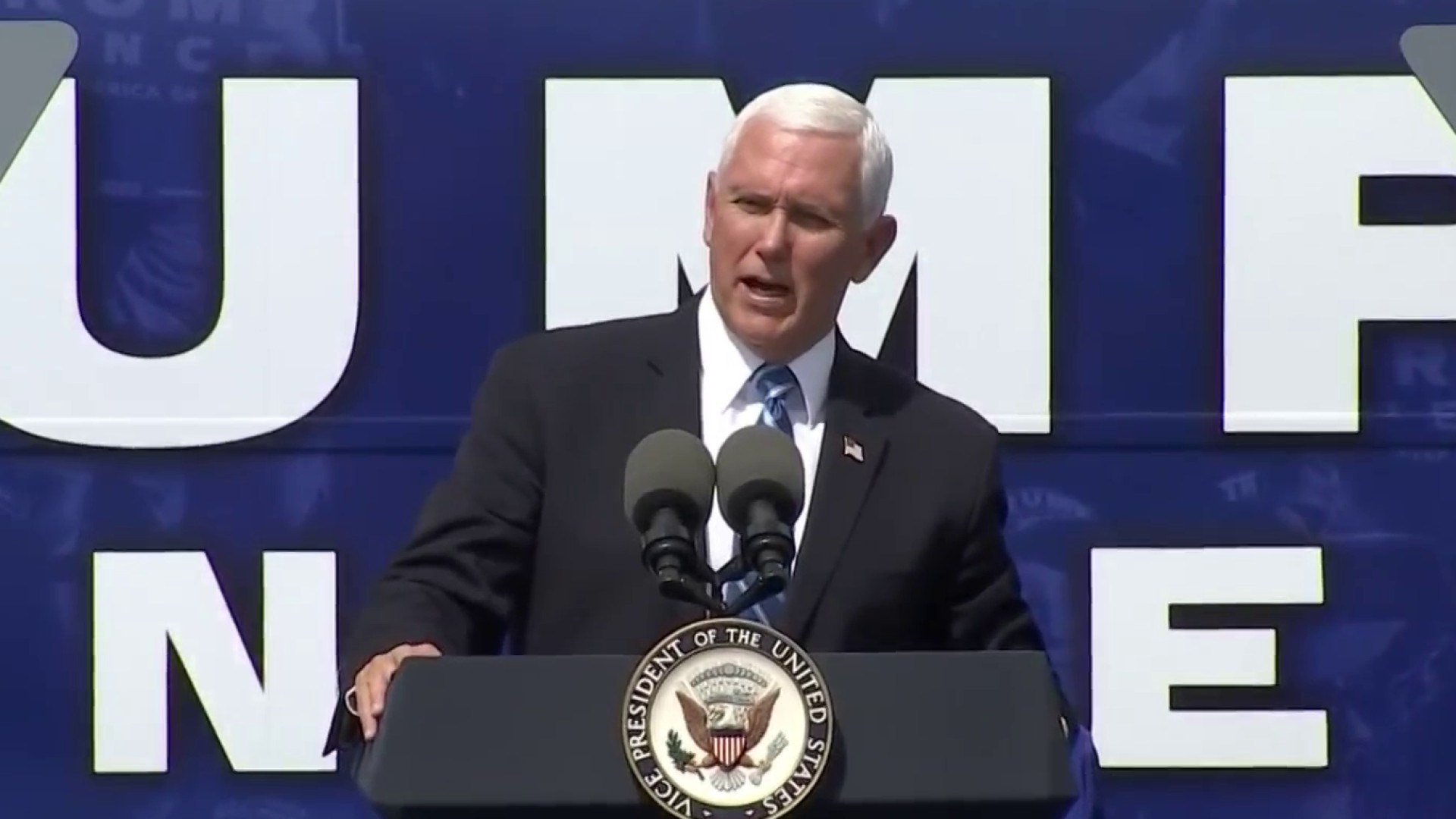President Donald Trump was evasive Thursday night when pressed if he took a COVID-19 test before his first debate with Democrat Joe Biden during a town hall in Miami that was hosted by NBC News.
Biden, appearing nearly 1,200 miles away at a dueling town hall from ABC News, denounced the White House's handling of the virus that has claimed more than 215,000 American lives, declaring that it was at fault for closing a pandemic response office established by the Obama administration. Trump, meanwhile, was defensive and insisted that the nation was turning the corner on the virus, even as his own battle with the disease took center stage.
Trump, less than two weeks after being diagnosed with COVID-19, dodged directly answering whether he took a test the day of the Sept. 29 debate, only saying “possibly I did, possibly I didn’t.” Debate rules required that each candidate, using the honor system, had tested negative prior to the Cleveland event, but Trump spoke in circles when asked when he last tested negative.
DECISION 2020
It was his positive test two days later that created Thursday's odd spectacle, which deprived most viewers of a simultaneous look at the candidates just 19 days before Election Day. The moment seemed fitting for a race unlike any other, as yet another campaign ritual was changed by the pandemic that has rewritten the norms of society.
The presidential rivals took questions in different cities on different networks: Trump on NBC from Miami, Biden on ABC from Philadelphia. Trump backed out of plans for the presidential faceoff originally scheduled for the evening after debate organizers said it would be held virtually following Trump’s COVID-19 diagnosis.
Critics of NBC questioned why the network scheduled Trump for the same time, making viewers have to choose if they were interested in seeing both candidates react live in a similar format.
NBC News released the following statement regarding the town hall:
"We share in the frustration that our event will initially air alongside the first half of ABC’s broadcast with Vice President Biden. Our decision is motivated only by fairness, not business considerations. We aired a town hall with Vice President Biden on Oct. 5 at 8 p.m. If we were to move our town hall with President Trump to a later time slot, we would be violating our commitment to offer both campaigns access to the same audience and the same forum. We hope voters will watch both discussions – ours will be available at any time, free and on-demand on YouTube, Peacock and all our digital news platforms."
The town halls offered a different format for the two candidates to present themselves to voters, after the pair held a chaotic and combative first debate late last month. The difference in the men’s tone was immediate and striking.
Trump was Trump. He was loud and argumentative, fighting with the host, Savannah Guthrie, refusing to outright condemn the QAnon conspiracy group, testily declaring he would denounce white supremacy but complaining about the questioning — and eventually saying for the first time that he would honor the results of a fair election, but only after casting an extraordinary amount doubt on the likeliness of fairness.
“And then they talk ’Will you accept a peaceful transfer,'" Trump said. “And the answer is, ‘Yes, I will.’ But I want it to be an honest election, and so does everybody else.”
Biden meanwhile, took a far different, softer, approach with audience questions. The former vice president, who struggled growing up with a stutter, stuttered slightly at the start of the show and at one point squeezed his eyes shut and slowed down his response to clearly enunciate his words. At times his answers droned on.
Dressed in a blue suit and holding a white cloth mask in one hand, the Democratic nominee also brought a small card of notes on stage and referred to it while promising to roll back tax cuts for the wealthiest Americans.
He said doing so would save “let me see... $92 billion.”
The two men are still scheduled to occupy the same space for a debate for a second and final time next week in Nashville. But the cancellation of Thursday’s debate still reverberated for both campaigns.
Trump and Biden battled on Sept. 29 in Cleveland in a debate defined both by the president’s constant hectoring of his opponent, which sent his support lower, and by its place on the calendar: just two days before Trump announced he had tested positive for coronavirus.
Trump was hospitalized for three days, and while he later convalesced at the White House the debate commission moved to make their second debate remote — which the president immediately rejected.
Earlier Thursday, Trump appeared at a rally in North Carolina, underscoring the challenge confronting him in the final weeks as multiple polls have shown him trailing Biden nationally and in many swing states. Trump has spent much of the week on defense, campaigning in states he won in 2016, such as North Carolina and Iowa, where he campaigned Wednesday.
But despite the polling, Trump predicted a “big, beautiful red wave” on Election Night, before referencing another one of his major challenges: A cash disadvantage to the Biden campaign, which just announced raising a record-breaking $383 million in September.
On top of the events, authorities are also advising those who will be in the area to expect traffic delays and possible road closures.

Trump is scheduled to take part in campaign events Friday in both Fort Myers and Ocala.
NBCUniversal is the parent company of NBC News, as well as this station.
___
Lemire reported from New York. Additional reporting by Associated Press writers Bill Barrow in Wilmington, Delaware, and Zeke Miller and Alexandra Jaffe in Washington.



